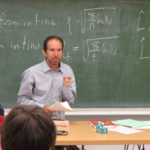Criteo is organizing the Machine Learning in the Real World workshop. This workshop aims at bringing together people from the industry and from academia to better understand which machine learning algorithms are used in practice and what we can do to improve them.
Who should come?
Anyone who is involved in applying machine learning on real world data is welcome. We especially expect to see:
- PhD students, faculty members, and industry research scientists.
- Software engineers using machine learning in applications.
- Entrepreneurs looking to apply machine learning to solve new challenges.
This event is primarily intended for people with technical fluency in machine learning to help each other advance the state of the art. If you are interested in learning about the basics of the field, there are plenty of other great events in Paris which are probably more appropriate.
Attendees
To maintain meaningful interactions, we will keep the number of participants to around 60. We will select the applicants based on proficiency in machine learning but we will also ensure a good balance between academia and industry, as well as a diversity of backgrounds and interests.
Here is a sample of people you will get to meet, based on early signups:
– Alexandre d’Aspremont, Professor at ENS Paris
– Alexandre Gramfort, Assistant Professor at Telecom ParisTech
– Francis Bach, Researcher at INRIA
– Vianney Perchet, Professor at ENS Cachan
– Nicolas Usunier, Research Scientist at Facebook AI Research
If you would like to participate, please apply here before November 13th .
Open Discussion Topics
To encourage discussions, multiple rooms will be available, each with a suggested topic. Participants interested in discussing a particular topic can enter the corresponding room and join in on-going discussions. We encourage you to choose which topics you are interested in or to submit your own here (link to application). We will select those with the strongest appeal.
Logistics
The event will take place in Criteo headquarters, 32 rue Blanche, 75009 Paris, on November 29th with talks from leading researchers in the morning while the afternoon will be dedicated to open discussions with suggested themes to foster interactions between participants. Breakfast and lunch will be provided and there will be a banquet after the workshops at 6PM. Criteo cannot provide lodging or travel to the participants but we are happy to help if you want information about local accommodation.
Tentative schedule
8:30 – 9:00: Breakfast and welcome
9:00 – 9:45: Shie Mannor, Adaptive label acquisition in non-stationary environments
9:50 – 10:35: Nicolò Cesa-Bianchi, Algorithmic challenges in real-time bidding
10:40 – 11:25: John Shawe-Taylor, Conditional Mean Embeddings for Reinforcement Learning
11:30 – 12:15: Jonas Peters, Connections between causality and machine learning
12:15 – 13:30: Lunch
13:30 – 18:00: Open discussions
18:00 – 19:00: Cocktail
Speaker bio & abstracts

Shie Mannor
Technion
Title : Adaptive label acquisition in non-stationary environments
Abstract
Collecting and storing labels from different sources is key to train and evaluate supervised learning algorithms. However, labels are often expensive to obtain, thus selecting which items to get labels for is key to optimally use any available labeling budget, both when training and evaluating a model. At the same time, if available labels are not correctly used, incorrect or biased results can be produced.
In this talk I will discuss some of the challenges and potential pitfalls of acquiring and using labels for classification in an evolving environment. I will present a system that store labels, provides a way to select labels to optimize budget while providing accurate and unbiased evaluations of the classification models.
Bio
Shie Mannor is a Professor of Electrical Engineering at the Technion.
He earned a PhD in Electrical Engineering from the Technion in 2002. He was then a Fulbright postdoctoral associate with LIDS (MIT) for two years. He was subsequently a Professor at McGill University for six years, where he was an incumbent of a Canada Research Chair in Machine Learning. Since 2009 he has been with the Andrew and Erna Viterbi Department of Electrical Engineering, where he is a full Professor.
Shie has published over 70 journal papers and over 130 conference papers in leading venues and holds 8 patents. His research awards include several best paper awards, the Henri Taub Prize for Academic Excellence, an ERC Starting Grant, an HP Faculty Award and a Horev Fellowship.
Shie’s research interests include machine learning and data sciences, planning and control, analysis and control of large-scale systems, and interconnected systems.
 Nicolò Cesa-Bianchi
Nicolò Cesa-Bianchi
Università degli Studi di Milano
Title: Algorithmic challenges in real-time bidding
Abstract
Online ads are mostly sold via second-price auctions run on a per-impression basis by ad exchanges. Publishers can boost their revenues by dynamically choosing the reserve price in each auction. In this talk we review the main algorithmic challenges that arise in the context of reserve price optimization. Our focus will be on regret minimization approaches with mathematical guarantees on their performance. We will consider various practical issues including exploiting auction features and coping with strategic bidders.
Bio
Nicolò Cesa-Bianchi is professor of Computer Science at the University of Milano. He was President of the Association for Computational Learning and member of the steering committee of the EC-funded Network of Excellence PASCAL2. He held visiting positions with UC Santa Cruz, Graz Technical University, Ecole Normale Superieure, Google, and Microsoft Research. He received a Google Research Award (2010) and a Xerox University Affairs Committee Award (2011-2014). His research interests focus on: theory and applications of machine learning, sequential optimization, and algorithmic game theory. On these topics, he published two monographs: “Prediction, Learning, and Games” (Cambridge University Press, 2006) and “Regret Analysis of Stochastic and Nonstochastic Multi-armed Bandit Problems” (NOW Publishers, 2012). He has over 150 indexed publications, including more than 40 papers in international scholarly journals. Overall, his papers have been cited over 10000 times.

Jonas Peters
University of Copenhagen
Title: Connections between causality and machine learning
Abstract
Causal knowledge is required in order to predict a system’s response after an intervention. In this talk, we argue that machine learning methods can benefit from causal ideas in problems that go beyond predicting variables in interventional settings. Connections to systematic noise removal, reinforcement learning and domain adaptation exist but are not yet fully understood. We present applications in advertisement and exoplanet search. The talk covers joint work with numerous people, including B. Schoelkopf, D. Janzing, L. Bottou and M. Rojas-Carulla.
Bio
Jonas is an associate professor in statistics at the University of Copenhagen, he is a member of the “Junge Akademie”. Previously, Jonas has been leading the causality group at the MPI for Intelligent Systems in Tübingen and was a Marie Curie fellow at the Seminar for Statistics, ETH Zurich. He studied Mathematics in Heidelberg and Cambridge and did his PhD with B. Schölkopf, D. Janzing and P. Bühlmann, his thesis received the ETH medal. He has been working with L. Bottou at Microsoft Research Redmond (WA, USA), M. Wainwright at UC Berkeley (CA, USA) and P. Spirtes at CMU (PA, USA).

John Shawe-Taylor,
University College London
Title: Conditional Mean Embeddings for Reinforcement Learning
Abstract
Conditional Mean Embeddings (CME) provide a way of learning to estimate expectations under unknown distributions. We consider their application to learning the system dynamics for Markov Decision Processes (MDPs). This results in a model-based approach to their solution that reduces the planning problem to a finite (pseudo-) MDP exactly solvable by dynamic programming. Unfortunately the size of the finite MDP scales badly with the amount of experience. By approximating the loss function of the CME the size of the induced (pseudo-) MDP can be compressed while maintaining performance guarantees. At the same time the CME model can itself be approximated using a fast sparse-greedy kernel regression. The performance of the composite method compares favourably with the state-of-the-art methods both in accuracy and efficiency.
Bio
John Shawe-Taylor is a professor at UCL where he directs the Centre for Computational Statistics and Machine Learning and heads the Department of Computer Science. His research has contributed to a number of fields ranging from graph theory through cryptography to statistical learning theory and its applications. However, his main contributions have been in the development of the analysis and subsequent algorithmic definition of principled machine learning algorithms founded in statistical learning theory. He has co-authored two influential text books on kernel methods and support vector machines. He has also been instrumental in coordinating a series of influential European Networks of Excellence culminating in the PASCAL networks.
